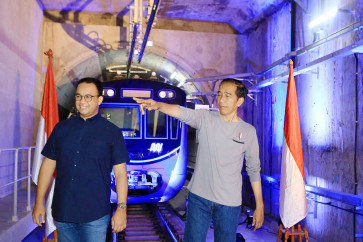Popular Reads
Top Results
Can't find what you're looking for?
View all search resultsPopular Reads
Top Results
Can't find what you're looking for?
View all search resultsCan Jokowi take back Jakarta from Anies?
Aside from the national tally for the presidential race, the outcome in Jakarta will show whether President Joko “Jokowi” Widodo can take back the city from Anies Baswedan, the current governor. This is a crucial race for the incumbent president, both in a personal and political dimension.
Change text size
Gift Premium Articles
to Anyone
W
hen the election results are tallied in a few weeks’ time, one counting will be critical. Aside from the national tally for the presidential race, the outcome in Jakarta will show whether President Joko “Jokowi” Widodo can take back the city from Anies Baswedan, the current governor. This is a crucial race for the incumbent president, both in a personal and political dimension.
Jokowi first won the city’s governorship in 2012 and had major support in the capital in the 2014 presidential election. He left the city in the care of his vice-governor and close ally, Basuki “Ahok” Tjahaja Purnama. In a contentious gubernatorial race in 2017, Ahok lost to Anies, marking the watershed moment for both Jokowi’s political fortunes and Indonesian politics in general.
The 2017 gubernatorial election was very much a continuation of the political rivalry between the Jokowi-Megawati alliance and Prabowo Subianto and his coalition partners in the 2014 presidential election when Jokowi won. In the gubernatorial race, Anies was Prabowo’s surrogate.
Looking at Jakarta’s voter dynamics in the 2014 presidential race and the two-stage 2017 gubernatorial election revealed how each of them was perceived and received by the communities at subdistrict level, and it could become the baseline in anticipating the outcome of next week’s election.
In 2014, Jokowi edged his opponent by around 6 percentage points in the capital or about the same margin as the national outcome. He secured some 2.8 million votes against 2.5 million for Prabowo and was ahead in three of Jakarta’s five municipalities. He garnered the largest support from the west, followed by the northern region and central district. Prabowo scored well in the eastern part of the city and won narrowly in the southern corner.
With such substantial ground and a relatively comfortable approval rating, Ahok and Jokowi were optimistic when they entered the Jakarta race in 2017. In a three-way race — which was contested by Ahok, Anies and Agus Harimurti Yudhoyono — no one secured an outright win, which resulted in a runoff between Ahok and Anies.
Despite leading in the firstround of balloting, a telltale sign of weakness in Ahok’s support emerged. By garnering some 2.35 million votes, he underperformed by a sixth when compared to Jokowi in 2014 — a loss of more than 500,000 votes. He lost ground in all subdistricts in the capital at about the same rate. He only won in areas where Jokowi was ahead in the north, west and central districts, but it was still below what the President garnered.


















